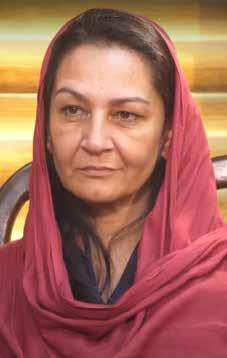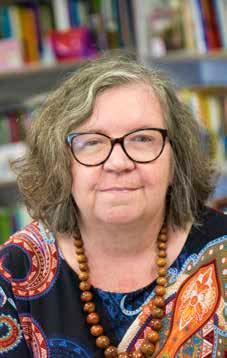
7 minute read
Remarkable Women Hall of Fame Inductees
from Well Red 2022
Reena Ghelani (Class of 1987)
Human Rights Lawyer
Reena works tirelessly to protect people and empower women who have suffered from conflict and disaster. She helps these women’s voices be heard, putting them at the forefront of decision-making, designing and implementing projects and peace.
Reena currently works for the United Nations Office for Co-ordination of Humanitarian Affairs (OCHA) as the Operations Director. The OCHA’s mission is to coordinate the global emergency response to save lives and protect people in all humanitarian crises. As the Operations Director of OCHA, Reena is responsible for all field operations worldwide, supporting Humanitarian Coordinators and is the lead adviser to the Under-Secretary-General on operational decision-making.
“When you see the power of what humanitarian aid is: to be with front-line workers – nurses, doctors, vaccinators and people running refugee camps – who are literally helping people survive. That is what this job is all about. It is one the most amazing privileges to work in humanitarian aid. I wake up every day and feel like I need to keep going because I know there is a need for our work.”
Reena has held several roles within the United Nations office including the Deputy Director of the Coordination and Response Division (CRD), serving as the Chief of Middle East and North Africa operations (CRD), and various other capacities in the Middle East, Africa and Asia. Prior to joining the OCHA, Reena held several assignments with the High Commissioner for Refugees (UNHCR), Department of Peace Operations (DPKO), and has been a Protection/Human Rights Officer for the United Nations Assistance Mission to Afghanistan (UNAMA). She has also worked with the Australian Government‘s aid program. Due to the nature of Reena’s work, most of the projects she is involved with are highly confidential. However, some of her projects include food security in South Sudan; raising awareness and funds for millions fleeing Congo; coordinating response efforts in Lebanon following the blasts that devastated Beirut; navigating a major crisis of people fleeing fighting in Syria and Ukraine; and response efforts relating to the COVID-19 pandemic. Reena has also spent time in Afghanistan meeting with the Taliban, negotiating to gain a greater understanding of their intentions regarding the education and working rights of women.
This line of work is not for the fainthearted and Reena does an incredible job of advocating for those who don’t have a voice. Her all-girl education at Mentone Girls’ Grammar helped cement Reena’s drive to empower female humanitarians. “Women know their communities and their societies, and they know the right solutions. When you put women at the centre of designing programmes, you get a different kind of response. You know it will capture the most vulnerable.”
“I have nothing but wonderful memories of my time at Mentone Girls’ Grammar. The environment the teachers created allowed us to challenge ourselves and really reflect on who we are as people, how we can be our best and contribute to the world. Today I work frequently with communities who have literally nothing, but mostly only ask for one thing: education for their children so they have the foundations to change their life. A school where girls can thrive is the foundation to open opportunities and potential. Mentone Girls’ was always this place for me.”
(continued)

Vera Mackie (Class of 1973)
Emeritus Professor
A single change to the school curriculum at Mentone Girls’ Grammar in the 1970s paved Vera’s career path. Today, she is a renowned academic in her field who specialises in Japanese feminism and gender history.
Vera was born in Glasgow, Scotland, migrating with her family to Victoria, Australia when she was just nine years old. Vera commenced her secondary education at Mentone Girls’ Grammar in 1968, graduating in 1973. During this time, high schools in Australia were beginning to turn their focus to our closest neighbours, the Asia-Pacific region, and languages from this part of the world were introduced into the curriculum. This saw the introduction of Japanese at Mentone Girls’ Grammar. It was this single shift in Vera’s schooling curriculum that shaped the trajectory of her career.
Vera was one of the first group of six students to study the Japanese Language at Mentone Girls’ Grammar.
“It was wonderful to be in a small school which cared for the individual needs of its students. Mentone was willing to make a long-term investment in building up the Japanese language program from small beginnings to a program with a sound reputation.”
She immediately fell in love with this rich, yet difficult language. Vera went on to complete a Bachelor of Arts with Honours and a Masters degree at Monash University, both focusing on Japanese and Linguistics. In 1994 she completed her PhD in History and Women’s Studies at the University of Adelaide.
“I consolidated my knowledge of Japanese with studies at Monash University and then, thanks to a Japanese government scholarship, in Japan. The early stages of my academic career were built on the ability to undertake intensive academic research in primary sources in the Japanese language.” Over the years, Vera has enjoyed teaching the Japanese language, Japanese studies, Asian studies, Gender studies and Cultural studies. She has held teaching positions at various institutions including Swinburne, the University of Melbourne and the University of Wollongong. She has also held visiting Professorships and Fellowships at numerous universities in countries such as Japan, the USA, Singapore, the Philippines and Germany.
“I feel blessed to have pursued my academic career at the time I did, when Australian governments actively supported the study of Asian languages and studies.”
As she progressed through her studies, Vera’s proficiency in Japanese studies and linguistics began to intersect with her interest in gender and history. This also became the foundation of her first book, ‘Creating Socialist Women in Japan, 1900-1937’ (Cambridge 1997).
Since then, Vera has authored and edited a number of books including ‘Feminism in Modern Japan: Citizenship, Embodiment and Sexuality’ (Cambridge 2003); ‘Remembering Women’s Activism’ (Routledge 2019), with University of Wollongong’s, Associate Professor Sharon Crozier-De Rosa; and ‘IVF and Assisted Reproduction: A Global History’ (Palgrave, 2020), with University of Wollongong’s, Professor Sarah Ferber and Dr Nicola J. Marks.
Vera’s work and contributions have seen her awarded the title of Emeritus Professor of Asian and International Studies in the School of Humanities and Social Inquiry at the University of Wollongong. She is also Foundation Director of the Centre of Critical Human Rights Research.

Alisha Withers (Class of 2001)
Commander, Royal Australian Navy
Over the last 20 years, Alisha Withers has forged a very successful career with the Royal Australian Navy. From protecting our borders to training and educating new recruits, Alisha has seen many facets of the Navy. Her commendable career is one to celebrated and honoured.
At the age of nine, Commander Alisha Withers’ family settled down to life in Melbourne, after her father left the Navy. Accustomed to Navy life and the values that go along with it, Alisha’s parents instilled in her a strong sense of service, thirst for adventure and determination. These qualities, coupled with the education she received at Mentone Girls’ Grammar, served Alisha well when she joined the Royal Australian Navy upon graduating.
“I grew up not being interested in following my parents’ footsteps, (but) it became the natural choice when I had started thinking seriously about my future.”
Upon joining the Navy in 2002, Alisha conducted her initial officer training at HMAS Creswell, followed by six months at sea. In 2003, she commenced further studies at the Australian Defence Force Academy, graduating with a Bachelor of Science (Mathematics and Oceanography). A thirst for further training resulted in Alisha attaining a Masters of Military and Defence Studies from the Australian War College.
Since becoming a qualified Maritime Warfare Officer in 2007, Alisha has qualified as a Fighter Controller, an Officer of the Watch, an Air Intercept Controller (AIC), a Principle Warfare Officer specialising in air warfare and has conducted numerous operational deployments and exercises. Some of her deployments include the Middle East Area of Operations SLIPPER, Operation RESOLUTE on multiple occasions and major exercises including RIMPAC (Rim of the Pacific), Talisman Sabre and the Royal Canadian Navy’s International Fleet Review. During her tenure she has also served in HMAS Canberra (II), Melville, Ipswich, Sydney and Newcastle, and been the Commanding Officer of HMAS Maitland.
Being in command of HMAS Maitland, Commander Alisha led her crew conducting Border Protection roles in the northern approaches to Australia.
“The highlight of my almost 20 years in the Navy is my two years in Command of HMAS Maitland, from 2014-2016. This incredibly rewarding and challenging experience enabled me to hone my leadership skills and gave me the confidence to strive for my next Command.”
In 2016, Alisha became the Fleet Direction Officer for Sea Training Group, responsible for on the job training of operations teams, before proceeding to the Australian Command and Staff College in Canberra in 2019.
By 2020, Commander Alisha was the Personal Staff Officer to the Deputy Chief of Navy and assumed the position of Current Operations Planner for the South West Pacific in Headquarters Joint Operations Command the following year. Alisha is currently the Commander of the Royal Australian Navy Recruit School.










